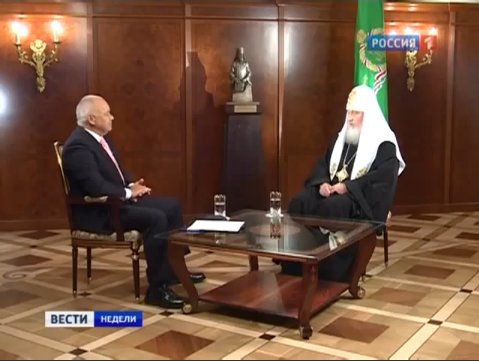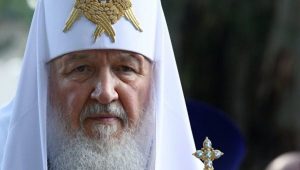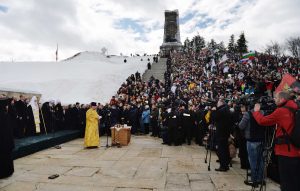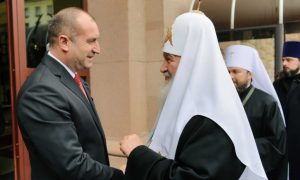Transcript: An interview with His Holiness the Patriarch of Moscow and All Russia conducted by the journalist Dmitry Kiselev was broadcast on the Rossiya TV Channel on 9 September 2012
 KISELEV: Your Holiness, the Church has encountered real aggression. In my view this phenomenon is part of a wider phenomenon – that of anomie. Anomie is a term invented by the French philosopher Emile Durkheim, who also founded the modern science of sociology back in the nineteenth century. This is the vacuum of values, the absence of norms. Does it not seem to you that our society stands on the threshold of this phenomenon, or has in part already sunk into this condition?
KISELEV: Your Holiness, the Church has encountered real aggression. In my view this phenomenon is part of a wider phenomenon – that of anomie. Anomie is a term invented by the French philosopher Emile Durkheim, who also founded the modern science of sociology back in the nineteenth century. This is the vacuum of values, the absence of norms. Does it not seem to you that our society stands on the threshold of this phenomenon, or has in part already sunk into this condition?
PK: To sum up what has been happening and is still happening in terms of aggression against our Church, we can say that this phenomenon is hardly a coincidence. I cannot help thinking that this is a sort of military reconnaissance. Just how deep the faith and devotion to Orthodoxy in Russia had to be put to the test. Many long ago abandoned any hope that our people, or at least the majority of our people, had any ability to organize themselves, to defend their positions. I will not quote the offensive statements made against our people by individuals who consider that they belong to the ‘creative class’ – that is a contemptuous top-down view. Probably the time had come for the test, especially after everything we saw going on when the Belt of the Mother of God was brought to Russia. We well remember what the reaction was to the millions of people who came to church then. Clearly, the time had come to take stock: Are our people really devoted to the faith? Are they capable of defending it? Are they capable of defending anything at all? And so these provocations took place.
Today, I think that all those who took part in these provocations are convinced that they are not confronting some faceless mass, a silent, amorphous majority, but people who are able to defend what is holy to them.
KISELEV: Yet this aggression is not only against the Church. This aggression is against any values at all. For them the Church is not a value. For them the victims of the NKVD Soviet Secret Police are not a value. Basically, this is all a protest against values. This is what not only annoys and causes resentment, but also depresses some and infuriates others.
PK: This is absolutely true. But we should add that this aggression goes against the heart of our culture, against the code of our civilization. The concept of the sacred has always taken center stage in the life of the people. This is where the concept of Holy Russia came from – not because we had many churches, but because the dominant idea in life was holiness and the sense of the sacred. A blow was struck precisely at our hearts, at this dominant idea.
At the same time you are right. We are talking about the dimension of values in our life. You mentioned Durkheim, but he was looking more at the moral state of society, he was saying that morality is a compulsory minimum, a strict necessity. It is a kind of bread of life for society, without which society falls apart and, you know, he was quite right. We cannot consider – and you know many today insist on it, denying the importance of the moral dimension of relations in society – that the main thing is the law, that law restrains people and keeps them in some sort of community life. But what stands behind the law? The threat of punishment. We are all together because if we break the rules for community life, we will be punished. But morality is an inner prerequisite for community life. It is a spiritual cement that unites people. This really is the fundamental concept of values and without it any human community disintegrates.
And this is what I wanted to talk about. People who completely deny God think that morality is a passing cultural phenomenon. Culture changes, the context in which people live changes – and so morality changes. In reality, this is not the case. For example, today all efforts are being made to shake the moral foundations of people’s lives, but they are not successful. Look at the statistics, projected by various sociological organizations: The vast majority of our people do not accept blasphemy. The percentage that approves of blasphemy is so small that it could be a statistical error. The vast majority of our people are in favour of laws that would limit the spread of sin. What does this mean? It means that the sense of morality is alive in people.
KISELEV: Your Holiness, one of the areas of attack is the accusation that Church and State are in union. How do you answer such attacks?
PK: We can answer in one word – this is a myth. And a myth that has been deliberately invented. You see, they have to attack the Church from some kind of ideological standpoint and that has to be invented. So today this myth of union has been invented, the myth that the Church is running your life. Why? It is to show that the union of Church and State is intended to control your mind and your will. This is a pseudo-ideology – a substitute for Communist ideology. And from this comes the conclusion: The Church is dangerous for freedom; it will enslave your mind.
Now let us get down to brass tacks. The union of Church and State. We have the document called the Social Concept of the Russian Church. Before the journalists started spreading this myth, they should have had a look at this booklet and what it says on the subject of Church-State relations. The Church defends its independence. The Church considers that only a free Church has the opportunity to have spiritual influence on people, that any union of Church and State, any ‘clericalization’ is ultra-dangerous for the Church’s preaching. We went through all that before the Revolution. Then there was a certain union, not through any fault of the Church, but through the fault of the State, which occupied the Church. So, there is not a single document, not a single statement, not a single word of the Patriarch, on the basis of which anyone could draw a conclusion about the union of Church and State.
Where did all this come from? This is where it came from: In the past 20 years, our own Church, which had been accused of inaction, of being unable to carry out its mission in the modern world, has achieved very impressive results in educating our people. Our people are becoming Orthodox. Today, just look at the crowds at the Easter services, at all the feasts in our churches. This is another people. There are people of average age, men and women, holding children in their arms, young people, children, the middle-aged and elderly – these are our people.
So, now let us say how a Christian politician, a member of the Orthodox Church, must behave, when he enters into dialogue with the Church. So, is he supposed to distance himself from his own convictions? He speaks to the Church as a child of the Church. He enters into a benevolent dialogue with the Church. Therefore, why should we conclude from the mere fact that the President or Prime Minister pray together with the Patriarch once or twice a year that there is a union? Are we supposed to deprive these people, who are after all believers of the right to pray with their Patriarch? Just this image arouses unhealthy feelings among those who do not want to see the Church growing in strength in our society.
Another image which our opponents present in order to prove their thesis of union of Church and State is this: the Patriarch visited the nuclear submarine base in Vilyuchinsk. So what? Are we to conclude that there is union of Church and State in the USA because US forces have chaplains in Afghanistan? Furthermore, do the armies of almost all European countries not have professional chaplains? I went to that base because the sailors invited me to visit them. I went to visit my flock because most of the sailors are believers. Where is there a so-called union in that? Such visits are pastoral, missionary visits. But then they show people such an image and they say: ‘Look at this union of Church and State’.
There is great confusion here. There is no union, but there is a Christianization of our society – that is what frightens those who are against us. That’s the rub, as they say. Fear that Orthodoxy, which had virtually been destroyed in Soviet times, has in the last 20 years been able to restore its people to life. Of course, not to the extent that we would like, but perhaps this whole media storm has been created in order to stop us. I want to say: it will not.
KISELEV: As summer drew to a close, you visited Poland. To what extent did you manage to heal the wounds which have come down to us through history?
PK: First of all, a word about history and modern times. Probably there are no two European peoples who have been so burdened by the weight of history and who have so rubbed salt into the wounds of history, poisoning the relations which exist today. We know that each side carries a heavy responsibility for all the sins of the other, each side tries to draw up a balance sheet, asserting, ‘My side is more in the right than the other, in other words, the other side caused me more suffering than I caused them’. And I am not sure that we will ever be able to change this mentality, however much the academics study history. What does this mean? Does it mean that we have to rub salt into these wounds of history for all eternity? Will we always have to open these wounds? Perhaps we should find some new approach to everything that has happened and is happening between us? You know two peoples live side by side in history. God ordained that we should always live side by side. As neighbours and as human-beings, sharing Christian values, surely we can build our relations on other foundations?
And so the idea came up of saying to the historians: ‘Take away all the problems of history because we want to open a new chapter in our relations’. But an act of reconciliation has to take place. In a dialogue with the Catholic Church in Poland which has lasted for three years, we agreed that the the key word in this reconciliation must be the word ‘Forgiveness’. We ask each other for forgiveness – as Christian communities, as Christian peoples, carrying out the will of the Saviour Himself. In our mutual relations we want to show our faithfulness to Christ, our faithfulness to the values of the Gospel, since it is on behalf of our attachment to the values of the Gospel that we ask one another for forgiveness.
And what do you think? When I got to Poland, I was struck by the enthusiasm with which the Polish people reacted to the message of the two Churches to the peoples of Russia and of Poland. Of course, there is always some opposition, but this is microscopic. The message itself was signed by myself and Metropolitan Józef Michalik, who is the president of the Conference of Catholic bishops in Poland, and in a symbolic setting – the royal palace. I am profoundly convinced that today we have created the ideological and psychological conditions in order finally to turn that heavy page which contains the mutual recriminations which have come down to us from the past and to start that new chapter in the relations between two Christian peoples. For we face the same challenges, connected with the destruction of Christian culture in Europe, with the rejection of Christian moral values of which we clearly speak in that message. We start out from the same positions, defending the same morality which we spoke of when we mentioned the far-sighted founder of the science of sociology.
KISELEV: Your Holiness, 4 November this year will mark the four hundredth anniversary of the expulsion of the Poles from Moscow. This is a national holiday in Russia and it will be widely observed. Can you imagine Warsaw sending a congratulatory message?
PK: I can. Now I can – just as I can imagine a message from Moscow to Warsaw congratulating them on the restoration of independence and territorial integrity of Poland. The thing is that if the psychological problems are removed, if people reach a state of reconciliation with one another, then all these actions are quite possible. But I would like to draw your attention to these circumstances: the celebration of Russian arms does not mean triumph over an enemy. We celebrate our victory, not their defeat, not their military failure. After all, a real soldier has only respect for a worthy opponent. In the same way the celebration of the fourth centenary of our victory and the end of the Times of the Troubles does not mean that we have a disrespectful attitude towards the other side – I would like to repeat that this is in no way connected with a triumph over their failures.
KISELEV: Thank you, Your Holiness!



















